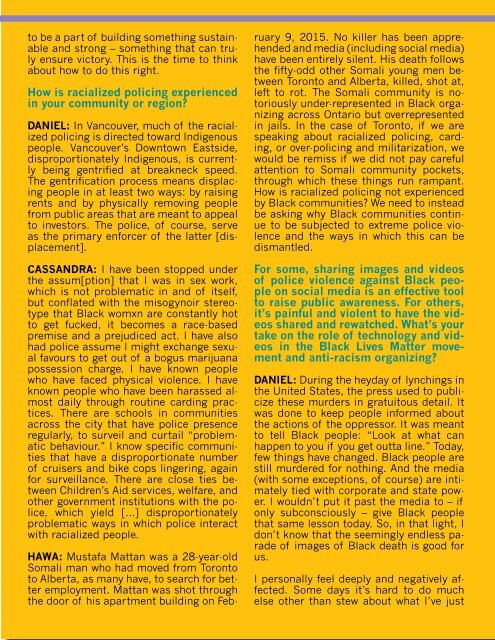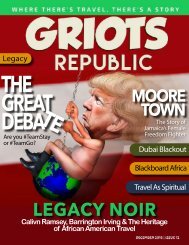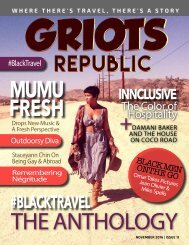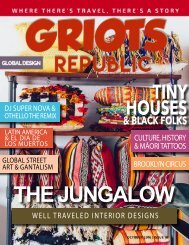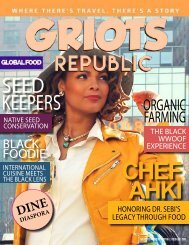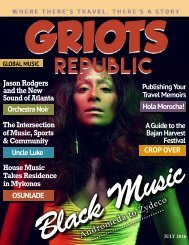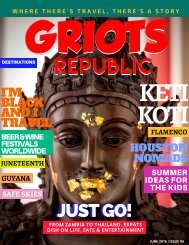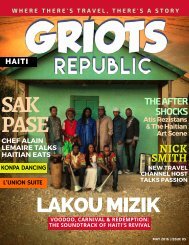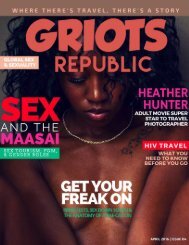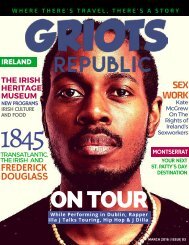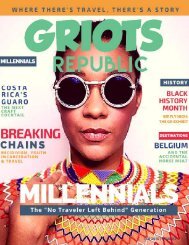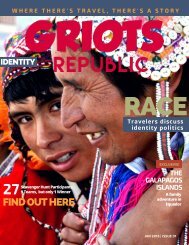GRIOTS REPUBLIC - AN URBAN BLACK TRAVEL MAG - AUGUST 2016
O Canada! Our August issue is a destination issue on Canada. Check out profiles from The Passport Party Project, Olympian Aaron Kingsley Brown, Oneika The Traveller and My Wander Year. This issue also includes a Black Lives Matter Special Section.
O Canada! Our August issue is a destination issue on Canada. Check out profiles from The Passport Party Project, Olympian Aaron Kingsley Brown, Oneika The Traveller and My Wander Year.
This issue also includes a Black Lives Matter Special Section.
You also want an ePaper? Increase the reach of your titles
YUMPU automatically turns print PDFs into web optimized ePapers that Google loves.
to be a part of building something sustainable<br />
and strong – something that can truly<br />
ensure victory. This is the time to think<br />
about how to do this right.<br />
How is racialized policing experienced<br />
in your community or region?<br />
D<strong>AN</strong>IEL: In Vancouver, much of the racialized<br />
policing is directed toward Indigenous<br />
people. Vancouver’s Downtown Eastside,<br />
disproportionately Indigenous, is currently<br />
being gentrified at breakneck speed.<br />
The gentrification process means displacing<br />
people in at least two ways: by raising<br />
rents and by physically removing people<br />
from public areas that are meant to appeal<br />
to investors. The police, of course, serve<br />
as the primary enforcer of the latter [displacement].<br />
CASS<strong>AN</strong>DRA: I have been stopped under<br />
the assum[ption] that I was in sex work,<br />
which is not problematic in and of itself,<br />
but conflated with the misogynoir stereotype<br />
that Black womxn are constantly hot<br />
to get fucked, it becomes a race-based<br />
premise and a prejudiced act. I have also<br />
had police assume I might exchange sexual<br />
favours to get out of a bogus marijuana<br />
possession charge. I have known people<br />
who have faced physical violence. I have<br />
known people who have been harassed almost<br />
daily through routine carding practices.<br />
There are schools in communities<br />
across the city that have police presence<br />
regularly, to surveil and curtail “problematic<br />
behaviour.” I know specific communities<br />
that have a disproportionate number<br />
of cruisers and bike cops lingering, again<br />
for surveillance. There are close ties between<br />
Children’s Aid services, welfare, and<br />
other government institutions with the police,<br />
which yield […] disproportionately<br />
problematic ways in which police interact<br />
with racialized people.<br />
HAWA: Mustafa Mattan was a 28-year-old<br />
Somali man who had moved from Toronto<br />
to Alberta, as many have, to search for better<br />
employment. Mattan was shot through<br />
the door of his apartment building on February<br />
9, 2015. No killer has been apprehended<br />
and media (including social media)<br />
have been entirely silent. His death follows<br />
the fifty-odd other Somali young men between<br />
Toronto and Alberta, killed, shot at,<br />
left to rot. The Somali community is notoriously<br />
under-represented in Black organizing<br />
across Ontario but overrepresented<br />
in jails. In the case of Toronto, if we are<br />
speaking about racialized policing, carding,<br />
or over-policing and militarization, we<br />
would be remiss if we did not pay careful<br />
attention to Somali community pockets,<br />
through which these things run rampant.<br />
How is racialized policing not experienced<br />
by Black communities? We need to instead<br />
be asking why Black communities continue<br />
to be subjected to extreme police violence<br />
and the ways in which this can be<br />
dismantled.<br />
For some, sharing images and videos<br />
of police violence against Black people<br />
on social media is an effective tool<br />
to raise public awareness. For others,<br />
it’s painful and violent to have the videos<br />
shared and rewatched. What’s your<br />
take on the role of technology and videos<br />
in the Black Lives Matter movement<br />
and anti-racism organizing?<br />
D<strong>AN</strong>IEL: During the heyday of lynchings in<br />
the United States, the press used to publicize<br />
these murders in gratuitous detail. It<br />
was done to keep people informed about<br />
the actions of the oppressor. It was meant<br />
to tell Black people: “Look at what can<br />
happen to you if you get outta line.” Today,<br />
few things have changed. Black people are<br />
still murdered for nothing. And the media<br />
(with some exceptions, of course) are intimately<br />
tied with corporate and state power.<br />
I wouldn’t put it past the media to – if<br />
only subconsciously – give Black people<br />
that same lesson today. So, in that light, I<br />
don’t know that the seemingly endless parade<br />
of images of Black death is good for<br />
us.<br />
I personally feel deeply and negatively affected.<br />
Some days it’s hard to do much<br />
else other than stew about what I’ve just


